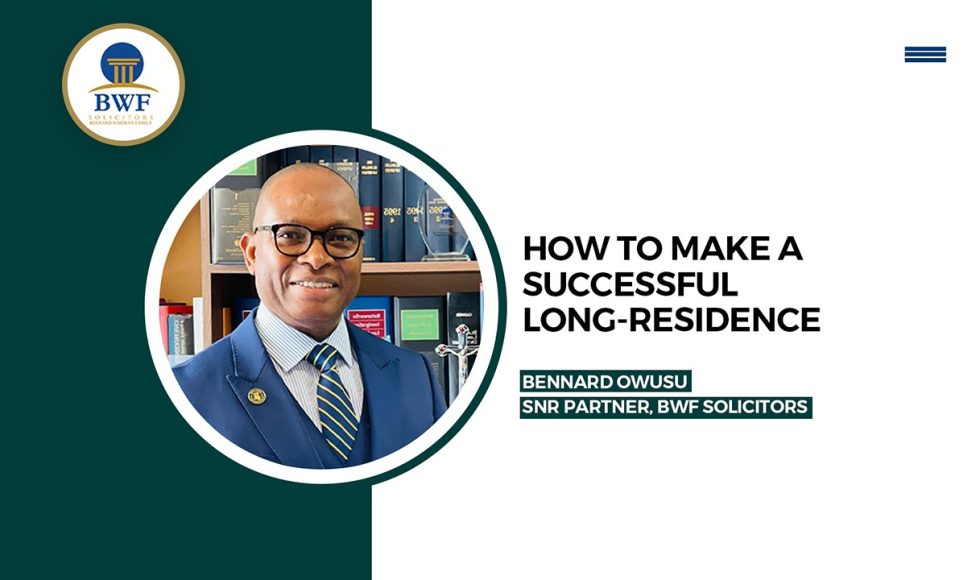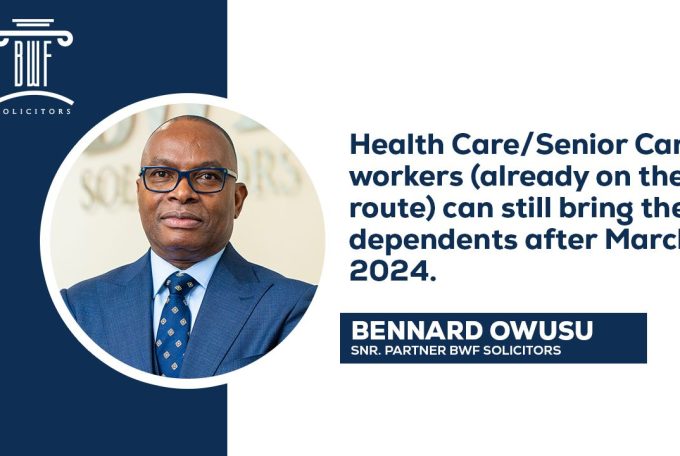The immigration rules allow migrants to apply for leave to remain in the UK if they are;
- between 18 and 24 years old and have lived continuously in the UK for more than half of their lives;
- under 18 and have lived in the UK continuously for at least seven years, and it would be “unreasonable” to expect them to leave the UK.
iii. 18 years old or older and have spent less than 20 years in the UK but would face “very significant problems” living in the country they would have to go to if not allowed to stay in the UK.
- 25 years old or over and have lived in the UK continuously for 20 years.
An application under these criteria is described by the Home Office as “applying on the basis of your private life”, but is more commonly called long residence.
20-Year Route
The 20-year rule on long residence is contained in Appendix Private Life of the Immigration Rules. Under the 20-year rule, a person does not have to have lived in the UK lawfully but simply “continuously”.
There are four requirements that an applicant needs to meet to qualify for leave to remain on this route:
- To apply using the correct form, which is called “Application to remain in the UK on the basis of family life or private life”;
- To make a valid application for leave by paying any relevant fees, attending a biometrics appointment, providing a passport or suitable identity document, and being in the UK on the date of the application;
- Not falling for refusal under the suitability requirements;
- Having lived in the UK continuously for at least 20 years;
Applicants will need to show that they have spent a continuous period of 20 years living in the UK by demonstrating that they have not had any significant periods of absence.
This means that they should not have had any periods of absence lasting longer than 6 months at any one time and that they have not spent more than 550 days in total outside of the UK during the 20-year period they are relying on.
The applicant should also not have been removed, deported, or have left the UK following the refusal of an application, and should not have left the UK without having a “reasonable expectation” at the time of leaving that they would lawfully be able to return.
Proving long residence with supporting documents.
The application for long-term residence usually fails or succeeds on the weight of supporting documents to prove the residence. It is difficult to provide evidence of 20 years of continuous residence if those periods have been without regular immigration status. You may not have had formal accommodations or income.
The Home Office looks more positively on official documentation proving your residence in the UK, but you may not always be able to get this. Think about who could provide statements to evidence your presence in the UK.
Home Office guidance says that they expect to see evidence that covers every 12-month period of the 20 years. Although this is not what the law says, if you cannot provide evidence that covers every year of the 20 years, the Home Office is likely to refuse your application. A judge may make a different decision if you appeal the refusal, however.
In Khan, R (on the application of) v Secretary of State for the Home Department [2016] EWCA Civ 416 (04 May 2016), the principal issue that the Court of Appeal considered was whether only “official” documents were required to support an application for indefinite leave on the basis of continuous long residence or whether non-official but “independent” documents would suffice.
It was acknowledged on behalf of the Secretary of State that a restriction providing that only “official documents” were acceptable evidence could not be defended, and a statement in the decision letter that she would not consider such evidence was an error of law (paragraph 58).
Lord Justice Beatson held at paragraph 60:
“…In my judgment, the Secretary of State was correct in not seeking to defend the part of the decision letter in which she stated that there was no evidence of residence in the UK from 1998 to 2001 because there were no official documents to this effect.”
The judge went on to explain further why it is not justifiable to rely on only the Home Office’s defined “official” list of documents.
At para 61,
“… I focus on what was stated in the letter itself. First, as Mr. Lewis accepted, there is no authority for such a restriction in legislation or Immigration Rules.
Secondly, as recognised, for example, in ZH (Bangladesh) v Secretary of State for the Home Department [2009] EWCA Civ 8 at [3], the 14-year rule set out in Rule 276B(i) makes it likely that those in the United Kingdom without leave, and therefore without status, will have no official documentation, particularly in the early period of their residence.
Thirdly, although most of the documents listed by the Secretary of State can be classified as “official” in the sense that they are from institutions and not individuals, a tenancy agreement and a letter from a landlord, which are listed, are difficult to classify as “official”.
It follows that any documents obtained over the past 20 years that confirm the applicant’s name and/or address will suffice, including personal statements written by friends and family who confirm their knowledge of the residence. Copies of other official documents addressed to the applicant in the UK should be included, such as documents from the NHS, the DVLA, and HMRC, council tax bills, utility bills, bank statements, and pay slips.
In addition, evidence of working, even if without permission, will count towards acceptable evidence. In Mahmood (paras. S-LTR.1.6. & S-LTR.4.2.; Scope), Bangladesh [2020] UKUT 376 (IAC).
If there is a lack of official documentation available, applicants can consider submitting less formal documents, such as any letters received at their UK address and photos of them with family or friends in the UK. Letters should be obtained from current or former employers, schools or colleges, and business acquaintances or friends if necessary to build up a convincing picture of the applicant’s presence in the UK.
Evidence of accommodation over the period (tenancy agreements, mortgage documents, etc.) is also a good idea. If official documentation is not available, applicants should submit a greater quantity of documents than they would otherwise if these were available.
The private life caseworker guidance states that ‘official documentary evidence from official or independent sources that shows ongoing contact over a period of time will be given more weight in the decision-making process than evidence of one-off events’.
Suitability criteria and exclusions
There are “suitability” requirements to meet the criteria for these long residence applications, meaning that criminal convictions, “bad character”, poor immigration history, or unpaid NHS debts could disqualify you.
It is possible to apply “outside of the rules” in long residence applications if you cannot meet the suitability requirements, but it is hard to succeed in applications outside of the immigration rules. The time periods used to calculate your length of time in the UK to meet the criteria above cannot include any periods of imprisonment in the UK.
The Secretary of State has wide discretion to overlook applications that do not meet the rules and grant leave to remain outside the rules. In the case of R (Munir) v SSHD [2012] UKSC 32, the court stated that the SSHD has wide-ranging discretion under the Immigration Act 1971 to grant leave to enter or remain where leave would not be granted under the Immigration Rules.
Successful applications.
If you are successful in your application, you will be granted 2.5 years’ leave to remain. You can apply to renew your leave to remain (before it runs out). If successful, you will be granted another 2.5-year period of leave to remain. After ten years— that is, 4 x 2.5 years’ leave to remain—you will be able to apply for Indefinite Leave-to-Remain.
In October 2021, the Home Office announced a concession through which they may reduce the period of leave-to-remain from ten years to five years for people with leave under the “18–24 years old, more than half of your life in the UK” rule.
Read more here: https://assets.publishing.service.gov.uk/government/uploads/system/uploads/attachment_data/file/1158829/Private_life.pdf#page8
There is generally no access to public funds such as welfare benefits or homelessness support while you have these time-limited periods of leave to remain. You would need to demonstrate exceptional circumstances to have this “no recourse to public funds” restriction lifted.
Bennard Owusu is an accredited member of the Law Society Family Law Accreditation Scheme and a member of the Ghana Bar Association. Family Law Accreditation is a recognised quality standard for family law practitioners in the U.K.







